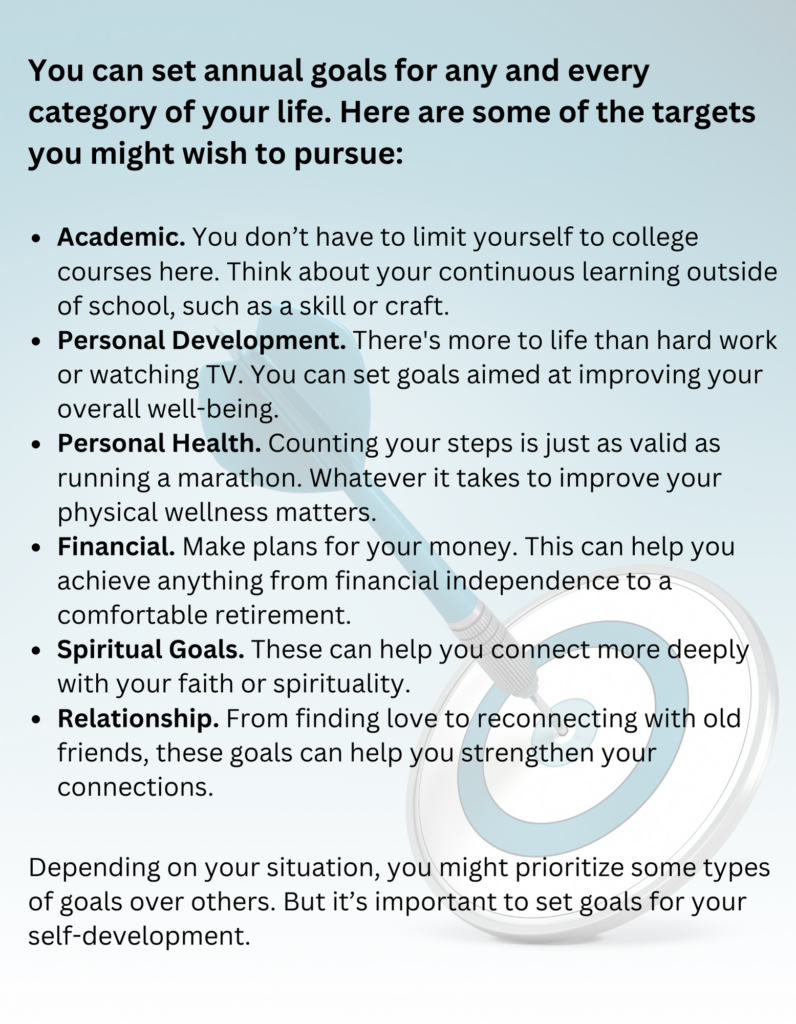Need help setting your New Year’s resolutions?
Many of us decide what our New Year’s resolutions will be sometime in December, normally when someone asks us if we are going to make any and what they are. It’s normally a spur-of-the-moment decision. This is a contributing factor as to why we normally break them so quickly.
A study conducted by OnePoll in conjunction with Crispy Green in 2020 found a self-aware lack of discipline (52%), followed by busy schedules and lacking the proper time to see them through (43%) are the top three reasons people gave for breaking their resolutions.
Two in five also point to societal and peer pressure as a big reason for their resolutions
are cut short.
But with better planning, you can set targets that are more suited to you and your needs. Let’s go over some yearly goals examples and how you can achieve them.
New Year’s is undoubtedly the most popular time to set your annual target.
From a psychological standpoint, it makes sense. The holiday offers a clear breaking point from the previous 12 months. It gives a sense of new beginnings, opening the door to more possibilities.

It’s tempting not to bother with setting annual goals. But they come with many benefits. Here are a few to consider before you rule them out.
They give you direction.
If you’ve ever felt stuck, goals are a way to pull yourself out. The best yearly goals give you something to strive for, pointing you toward success.
They allow you to track your progress.
Whether you’re aware of it or not, you’re always learning and moving forward. But you won’t notice your progress if you’re not paying attention. Goals give you a way to see how far you’ve come.
They help you stay accountable.
How many times have you told yourself, “I should really work out more.” Great! Let’s hold you to that. When you create goals, your lofty dreams become real. The next logical step is to take action. Looking at an unchecked “workout” box on your to-do list will remind you to keep working.
They keep you motivated.
Every time you achieve a goal, it’s a win. That deserves celebration. And every time you reward yourself, you boost your energy and build your motivation to keep going.
They halt procrastination.
A goal has a clear deadline. This forces you to plan accordingly and take the necessary steps to succeed.
They help you figure out what you want.
Without a clear target, it’s easy to never commit to a project. Setting a goal forces you to focus on what’s important.
No matter what you’re setting your goals for, here are some tips on how to do it effectively.
- Think about what you want. Be specific with what you want to accomplish. As you think about it, here are some questions to ask yourself:
- What do I want out of life?
- What kind of family life do I imagine?
- What are my career aspirations?
- What would I regret not doing before I die?
- These types of questions will point you in the right direction. They will help you visualize your ideal life to start striving for it.
- Be SMART about achieving your goals. Now that you have a direction, make SMART goals. SMART is an acronym for targets that are:
- Specific: you know exactly what you want to accomplish
- Measurable: you have a clear metric for measuring success
- Achievable: you’re able to accomplish your goal with your current skills and resources
- Relevant: your goal connects to your wider lifetime ambitions
- Time-bound: you have a clear time frame for achieving your goal
- Start small. Set smaller milestones that inch you toward your larger goal. Each should have clear deadlines to stay on task throughout the year. If you can’t accomplish it within the year, split it into several short-term goals.
- Tell your loved ones about your ambitions. You don’t need to broadcast your goals to the world. But if you tell even a handful of people, they’ll feel much more real. Also, if you’re ever feeling lost, they can remind you why you took on this challenge in the first place. They can also provide valuable feedback on how you’re doing.
- Re-evaluate your goals often. A lot can change in a year. A few months from now, you may want very different things than you do currently. Re-evaluating your goals will help ensure you’re always heading in the right direction.
- Reward yourself at each step. This means finding your “carrot” to celebrate a milestone. It could be a chocolate bar after a run or a day off after writing. Every time you reward yourself, you reinforce the habit of achieving your goals.
- Put your goals somewhere visible. Stick your list of goals to your bathroom mirror. Set them as your phone wallpaper. Tattoo them on your arm (okay, maybe don’t do this one). Whatever it is, make sure you can see and remind yourself of your goals every day.
- Believe in yourself. There will be bumps on your journey. But, as with most things in life, they’ll pass. It’s important to believe in your ability to overcome obstacles. Trust that you can achieve whatever you set your mind to.
So what are good goals to set? Here are some goal ideas for every area of your
life:

Academic Goals
- Research where you can take a class on what interests you and see if there’s financial aid available
- Take a class
- Read a nonfiction book about what interests you
- On the internet, Google “how to” videos
Personal Goals
- Spend less time watching TV
- Define your personal beliefs and values
- Start a new hobby
Personal Health Goals
- Wake up earlier
- Exercise three times a week
- Socialize more
Financial Goals
- Meet with a financial advisor or your banker to review your finances
- Consolidate your financial statements in one location so loved ones can
easily find them in case something unexpected happens to you.
Spiritual Goals
- Read the central texts of your religion
- Meditate for 20 minutes every day
- Take part in your religious community
Relationship Goals
- Learn a new skill together
- Go on more frequent dates
- Spend more time with your friends
Final thoughts
Pursuing a yearly goal is difficult. That’s a fact. But with a bit of planning, you can set yourself up for success. Doing so will pay you back in dividends. You’ll set yourself on a path of personal
growth and find new motivation every step of the way.


